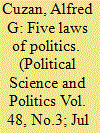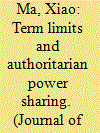|
|
|
Sort Order |
|
|
|
Items / Page
|
|
|
|
|
|
|
| Srl | Item |
| 1 |
ID:
123197


|
|
|
|
|
| Publication |
2013.
|
| Summary/Abstract |
OVER A century ago, a talented British newspaperman sent a manuscript on the irrationality of war to numerous London publishers. It was uniformly rejected on the grounds that the public was uninterested in the topic. After he paid a well-known firm to print his opuscule, it quickly garnered praise, and then, a few months later, an expanded edition became a publishing sensation. It sold several million copies and was almost immediately translated into twenty-five languages. At a moment when a highly nationalistic imperial Germany was arming itself to the teeth and Edwardian England was, in turn, bolstering its naval program, the book's thesis was as revolutionary as it was sweeping-that growing economic interdependence among nations rendered renewed conflict a thing of the past.
|
|
|
|
|
|
|
|
|
|
|
|
|
|
|
|
| 2 |
ID:
140222


|
|
|
|
|
| Summary/Abstract |
Drawing on more than 500 elections from around the world, this article presents five empirical laws of politics. Four of these laws span democracies and dictatorships, and one sets a boundary between the two. In both regimes the governing party or coalition represents a minority of the electorate. In democracies this minority usually represents a plurality that amounts to about one third of the electorate. Judging by the outcome of the first free elections in regimes undergoing a transition, there is reason to believe that in dictatorships the minority is much smaller. Even as they have an advantage over the opposition, the incumbents experience an erosion of support over time. In democracies this leads to alternation in office, which in turn ensures that across many elections about two-thirds of the electorate gets to see its favorite party or coalition in government from time to time. In dictatorships, during long periods in office, support for the ruling party shrinks to insignificance. Also in democracies, it is rare for incumbents to receive more than 60 percent of the vote, and it never happens twice within the same spell in government. This appears to be a reliable indicator that differentiates all democracies from most dictatorships. The conclusion is inescapable—the dictatorial “passion for unanimity” and illusion of “organic unity” notwithstanding, the state is a plurality. The will of the electorate emerges as a result of competition among political parties.
|
|
|
|
|
|
|
|
|
|
|
|
|
|
|
|
| 3 |
ID:
116604


|
|
|
|
|
| Publication |
2012.
|
| Summary/Abstract |
Despite all the optimism accompanying the uprisings of 2011, the Arab Middle East remains a stagnant region in deep socio-political crisis with little chance for positive change anytime soon. The current regimes may stay in power or get replaced by new dictatorships, moderate or radical. Either way, in the near future, weak states will continue to grapple with domestic problems and the direction of their foreign policies. For good reason, this situation has Israeli leaders worried about the implications for their country's national security. The changing regional balance of power favors Turkey and Iran, both of whom encourage radical elements in the region, not Israel, while the seeming decline in U.S. clout has negatively affected both the Arab-Israeli peace process and Israel's deterrent power.
|
|
|
|
|
|
|
|
|
|
|
|
|
|
|
|
| 4 |
ID:
146184


|
|
|
|
|
| Summary/Abstract |
What makes certain dictatorships more likely than others to democratize? I argue that military dictators, as specialists in violence, often remain threats to their successors. However, when democratic systems replace military dictatorships, that expertise presents less danger to new incumbents. Because democracies select leaders through elections, they reduce the importance of military expertise—and the role of associated violence—in contests for office. Thus, military dictatorships should prove more likely to transition quickly to democracy; military dictators will expect a lower likelihood of punishment—including death—at the hands of their successors than if they are replaced by other dictators. Therefore, incumbent military dictators see democratic systems as less dangerous to them; they face specific incentives to ensure a quick and effective transition to democracy. I provide support for my theory with evidence from the post-World War II period.
|
|
|
|
|
|
|
|
|
|
|
|
|
|
|
|
| 5 |
ID:
139525


|
|
|
|
|
| Summary/Abstract |
Some recent papers have concluded that authoritarian regimes have faster economic growth than democracies. These supposed growth benefits of autocracies are estimated using data sets in which growth rates rely heavily on data reported by each government. Governments have incentives to exaggerate their economic growth figures, however, and authoritarian regimes may have fewer limitations than democracies on their ability to do so. This paper argues that growth data submitted to international agencies are overstated by authoritarian regimes compared to democracies. If true, it calls into question the estimated relationship between government type and economic growth found in the literature. To measure the degree to which each government's official growth statistics are overstated, the economic growth rates reported in the World Bank's World Development Indicators are compared to a new measure of economic growth based on satellite imaging of nighttime lights. This comparison reveals whether or not dictators exaggerate their true growth rates and by how much. Annual GDP growth rates are estimated to be overstated by 0.5–1.5 percentage points in the statistics that dictatorships report to the World Bank.
|
|
|
|
|
|
|
|
|
|
|
|
|
|
|
|
| 6 |
ID:
141855


|
|
|
|
|
| Summary/Abstract |
Do remittances stabilize autocracies? Remittances—money sent by foreign workers to individuals in their home country—differ from other sources of external non-tax revenue, such as foreign aid, because they accrue directly to individuals and thus raise the incomes of households. We argue that remittances increase the likelihood of democratic transition by undermining electoral support for autocratic incumbents in party-based regimes. Remittances therefore make voters less dependent on state transfers. As a result, autocracies that rely heavily on the broad-based distribution of spoils for their survival, namely party-based regimes, should prove especially vulnerable to increases in remittances. Evidence consistent with this argument suggests that remittances promote democratization in some dictatorships.
|
|
|
|
|
|
|
|
|
|
|
|
|
|
|
|
| 7 |
ID:
108350


|
|
|
|
|
| Publication |
2011.
|
| Summary/Abstract |
Nominally democratic institutions such as political parties and legislatures are common in dictatorships, which rely on them to maintain control of the state. Parties and legislatures provide a means through which dictatorships co-opt potential opponents, distribute rents to supporters and mitigate elite conflicts. Indeed, regimes with these institutions have longer tenures than those without them. Using evidence from postwar dictatorships, this study demonstrates that parties and legislatures also enhance the ability of authoritarian regimes to withstand leadership transitions. Transfers of power are inherently destabilizing. Yet we find that dictatorships with parties and legislatures are far less likely to be associated with instability because these institutions insulate regimes from the disruptive effects of unconstitutional leadership transfers.
|
|
|
|
|
|
|
|
|
|
|
|
|
|
|
|
| 8 |
ID:
145828


|
|
|
|
|
| Summary/Abstract |
Term limits that effectively govern leadership transition play an important role in authoritarian power sharing. A fixed term and a pre-appointed successor – two crucial components of term limits – credibly commit the incumbent ruler to share power with other elites, and also allow the elites to monitor and coordinate against the ruler's transgression of the power-sharing agreement. While the successful adoption of term limits often requires an even balance of power among the ruling elites in the first place, once adopted it initiates an evolving bargain over allocation of political power among multiple generations of leaders that further keeps any one faction from dominating the others. I corroborate this argument using a biographical dataset of elite members of the Chinese Communist Party from 1982 to 2012. The findings suggest that the Party's incumbent leaders and their rivals (i.e., predecessor and heir-apparent) shared equal chances in promoting their associates—which proxy their political influence—and this pattern has become more salient since the 16th party congress, when the term limits that currently govern China's leadership transition became fully fledged. This result also sheds light on the role of informal, patronage-based promotion in the institutionalization of authoritarian politics.
|
|
|
|
|
|
|
|
|
|
|
|
|
|
|
|
|
|
|
|
|